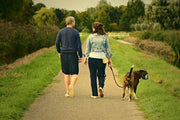
Whether it is to teach it a program for competition, to train it to become a working dog, or simply to teach it good manners, it is always a matter of learning in the relationships between humans and dogs.
When, by its disposition, a dog forces the admiration of its owner, you will hear me say: "It's in its blood, it's innate, I had nothing to do with it," and other such nonsense. It's a lovely message of love, but it's not true. Because there are behaviors that the dog will never learn, no matter what you do. There are also behaviors that it will acquire on its own, or better yet, that it has unconsciously dictated to you. The limits of its old age will convince you, and your confidence in its real abilities will be the basis for better understanding and avoiding wasting time and energy during its training.
To review some of the behaviors that you will never teach the dog, we will start with its arrival at home.
Cleanliness

Be assured, once and for all, that neither you nor anyone else will ever teach it to be clean. If you undertake this training, you will waste your time because the dog learns this on its own. As long as it is very young, be patient, it is a matter of time. Also, be patient, it is a matter of time. Do not tire yourself by rewarding it when it has done well, you would erode its confidence instead of encouraging it. Watch its feeding times and outings, take it out regularly. It will become clean sometimes before three months, never after five months. As an adult, a dog can hold itself for 16 hours without suffering. Dogs, even very young ones, who travel by train or plane in transport crates almost always refrain from soiling them. The dog is naturally clean, the time to be mature enough to control its sphincters. You only have to teach it the gutter, if you live in the city.
Barking

If you live in the city, you will also try to teach it not to bark or to bark less. Well, this etiquette is, fundamentally, very difficult to teach a born barker. When a stranger, a bird, a horse, another dog passes by, whether it is in the house, in a building, in a kennel, the dog barks. And it's even worse if it is on a leash. You will teach it to be silent by rewarding silence, giving it a caress, a treat. But do not expect more than the respect of your absence. Like all guard dogs, a hunting dog, or a dog on a guard is paid in kind. It does not understand that its owner does not want to hear it bark, it was born for this. Electric collars that send a discharge when the dog barks. They confuse the innocent dog who does not understand why it is receiving a shock and does not link the noise and the shock.
Americans, even more concerned than we are about avoiding noise pollution, have a definitive solution: they ask the veterinarian to sever the dog's vocal cords, which means it has to breathe heavily for its whole life.
Incorruptibility

Do not hope to teach your dog incorruptibility either. You will teach it to disdain hidden treats on the ground or that are offered to it, it will even wait for authorization. But you can never be certain that it will always refuse them. On the one hand, it does not like that you deny it food. On the other hand, an intruder may have once given it treats and the dog remembers it. You will have to admit a weakness, one more exception that you have wisely decided not to consecrate, that whatever you give it, you will always commend it and recommend acting as if it might succumb to temptation. In doing so, you might save its life...
Swimming
You will not teach your dog to swim either. It will know how to swim as soon as it is in the water or it will paddle all its life. It's a matter of style and especially morphology. Dogs with short bodies, somewhat dry and with a voluminous and cylindrical chest often swim poorly. They splash the water with their front paws as if they were playing the drum and stay too upright as if they were trying to touch the bottom with their back paws. You can put yourself in the water and improvise as a swimming instructor, your teaching will find its limits and your dog will continue to paddle, after having unintentionally scratched your body with its nails.
Courage

Courage, a quality poorly shared among all living beings, cannot be taught either. Then again, you can teach it to overcome some of its fears and anxieties, but never to overcome its laziness. In working dogs, an excess of dynamism is preferable to sluggishness. In companion dogs too, which is why breeds selected for work end up winning over those who are primarily interested in beauty. Energetic dogs are often more intelligent. And therefore more interesting.
Author: Jean-Yves Reguer




